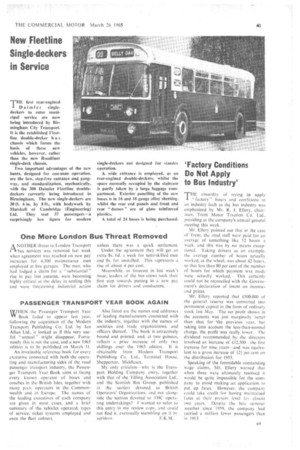'Factory Conditions Do Not Apply to Bus Industry'
Page 43

If you've noticed an error in this article please click here to report it so we can fix it.
THE absurdity of trying to apply " factory " hours and conditions to an industry 1.telt as the bus industry was emphasized by Mr. R. J, Ellery, chairman, Trent Motor Traction Co. Ltd., presiding at the company's annual general meeting this week.
Mr. Ellery pointed out that in the case of Trent, the road staff were paid for an average of something like 52 hours a week, and this was by no means exceptional. • Taking drivers as an example, the average number of hours actually worked, at the wheel, was about 42 hours. so that less than 80 percent of the number of hours for which payment was made were actually worked. This certainly could not he reconciled with the Government's declaration of intent on incomu and prices.
Mr. Ellery reported that £500,000 of the general reserve was converted into permanent capital in the form of ordinary stock last May. 'The net profit shown in the accounts was just marginally better than that for the .previous year. hut taking into account the less-than-normal charge, the proPt was really lower. The dividend recommended by the directors involved an increase of £12,500 the first increase for nine years—and was equivalent to a gross increase of 124 per cent on the distribution for 1955.
Speaking of the formidable outstanding wage claims, Mr. Ellery warned that when these were ultimately resolved it would be quite impossible for the company to avoid making an application to put up fares. However, the company could take credit for having maintained fares at their present level for almost two years. Despite the best summer weather, since 1959, the company had carried a million fewer passengers than M 1963




























































































































